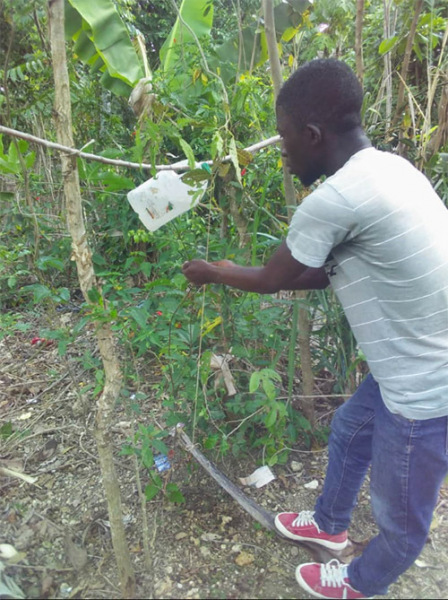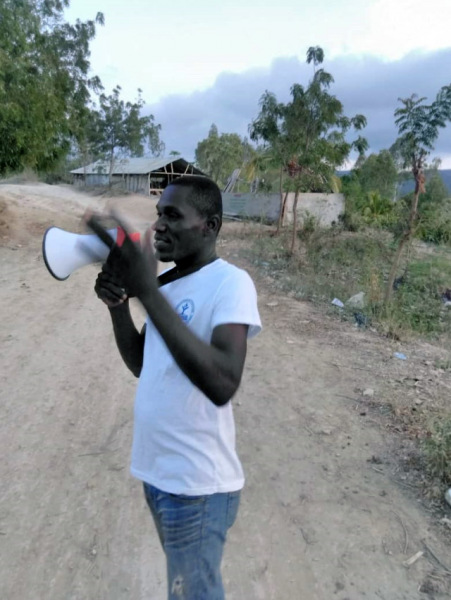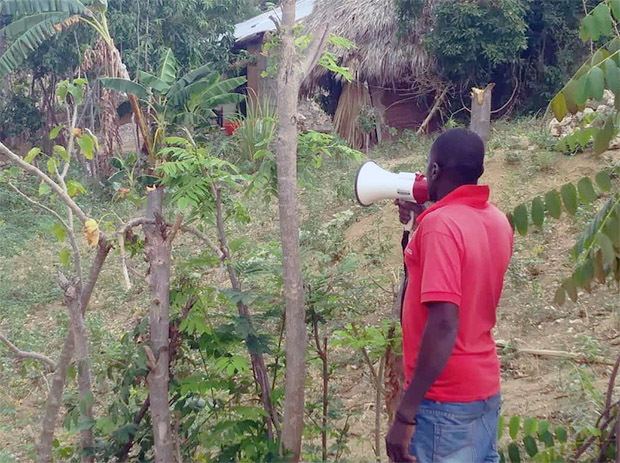To donate to the CWS Coronavirus Response Fund, including this program in Haiti, visit cwsglobal.org/coronavirus.
————-
Imagine, for a moment, that you woke up in Haiti’s Northwest Department this morning. Like the rest of the world, you would be living with the threat of COVID-19. But beyond that, a lot of things would be different from other places.
You would be living in a country that has been in a political crisis for a while. Since you’re now in the poorest part of Haiti, you have also been experiencing a food crisis for six months now. The price of food is rising all the time, but there’s less and less of it available. Things have gotten especially bad recently as borders have closed and trade has ground to a halt. There just aren’t food products coming into your community.
Normally, you would have planted your crops in March or April so that your family could harvest them soon. That would give you a way to put food on the table and sell what’s left to earn some money. But there was a drought this year, so you didn’t plant. Instead, you’ve had to eat the seeds that you had reserved for planting. That harvest won’t happen, and you don’t know how you’ll be able to feed your family once the seeds are gone.
You’ve heard about something called coronavirus. But you live in a rural area and don’t have a radio, so you don’t really know what’s going on. Can you trust the rumors and news that you’re hearing from neighbors? You’ve heard that the first people who reported cases of it were attacked, so you aren’t going to speak up if you think you might have it. Besides, there’s no hospital in your part of the country where you can get treatment if you do have symptoms. The government lockdowns that happened in late 2019 left hospitals in tough situations. They don’t have enough medical supplies, oxygen or even fuel to keep the power going.
So you do the only thing you can: try to protect your family and hope the virus doesn’t reach you. But how?
You’ve heard that washing your hands is important. But you don’t have running water at home or any soap. The government says that you must use a face mask, but you don’t own one. They also say that you should stay home. But you need to go out every day to get food, and you can’t afford to stock up. Plus, a day without work is a day without income. That means no food on the table. If you can’t work, you will need to sell off anything you own of value, including your livestock, to try to afford food.
Thousands of families aren’t imagining this. This is the situation that many of our Haitian neighbors woke up to this morning. It’s the same thing they faced yesterday, only it’s getting worse all the time.
“Parents are crying because they cannot give their children something to eat,” says Anouce Césaire, who lives in the Northwest. “It is not a question of how often they eat; they eat accidentally, by a miracle.”
We are seeing the situation deteriorate for our neighbors in the area, so we’re doing what we can to help. Together with our partners in the Northwest, we’ve put together a multi-step coronavirus response plan.
Step one is already underway: get accurate, updated information to families in rural areas. Our partners are spreading the word in their communities about the cause and transmission of coronavirus, plus how people can protect themselves. They are getting the word out through school directors, church leaders and community leaders. They are also walking through communities with megaphones to share the message door to door while social distancing. One partner, called KED, is bringing nurses and community health workers on board to help. Since people are still skeptical about coronavirus and trying to sort out myths from facts, we’re trying to make sure they can get information directly from health professionals.Soon, we’ll be in step two: getting hygiene supplies to people who don’t have them. We’ll be providing buckets with taps that people can use to wash their hands, plus soap and hand sanitizer. We’re already helping families create handwashing stations using suspended water containers, and we can continue to share tips and tricks like this with more families. One of our partners, called GRADAID, is also making personal protection equipment available for health centers and hospitals who request them through the Health Department of the Northwest.
Step three will focus on food security and helping families earn money. It could mean that we distribute seeds for crops with short growing seasons so that families can harvest them quickly. It also may mean returning to our regular work with these communities, helping them improve the ways they can make a living by fishing or farming. As plans evolve over the coming weeks, one thing is for sure: our top priority will be helping families strengthen livelihoods and food security.
As the situation our neighbors are facing continues to get darker, we know that we can offer some light. We’ve been in Haiti for decades, working with families to overcome hunger and poverty. With the help of CWS donors and supporters, we’re ready to keep going.
Margot de Greef is the CWS Country Representative in Haiti. Laura Curkendall is the Director of Program Communications.



